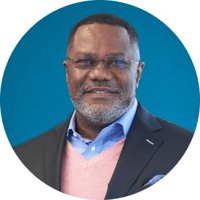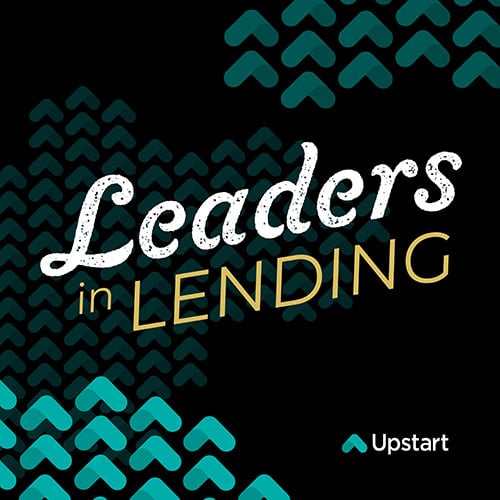Leaders in Lending | Ep. 94
Supporting Small Businesses as a CDFI and MDI
In this episode, Michael Pugh, President and CEO of Carver Federal Savings Bank, discusses how to better support small businesses and serve communities by developing programs based on improved data analysis.


GUEST SPEAKER
Michael Pugh
Michael Pugh is President and CEO of Carver Federal Savings Bank. Pugh is a banking executive with more than 29 years of experience and qualified as a financial expert. Pugh also has Board of Directors experience in internal controls and leadership influence for Audit and Compliance, Nominating and Governance, Credit and Institutional Strategy Committees. He has managed teams of 1200 associates in retail, business banking, commercial and residential lending and call center operations.

ABOUT
Carver Federal Savings Bank
Key Topics Covered
- Roles of MDIs and CDFIs in helping communities grow businesses
- The importance of capital access for underserved business owners
- Understanding the voice and perspective of members who have difficulty accessing capital

“When you consider the idea that 40 million Americans or so don't have a traditional credit score that would allow them to get access to capital, if you are an entrepreneur, without access to capital, you can't grow and sustain your business. And so by looking at these alternative sources, we believe that we ultimately can help individuals get on the credit map, and start to build a much brighter financial future.”

“If we can help build some level of equality in terms of access to capital, credit and education that supports it as a foundation, we can systemically improve our nation’s GDP.”

“I think community banks will continue to gain momentum, they will continue to be seen, especially CDFIs.”
EPISODE RECAP & SUMMARY
The banking industry is increasingly leveraging innovations in alternative data to underwrite loans for consumers and small businesses. This can make a significant impact in communities that Minority Depository Institutions (MDIs) and Community Development Financial Institutions (CDFIs) serve.
In this episode, Michael Pugh, CEO of Carver Federal Savings Bank, discusses how to better support small businesses and serve communities by developing programs based on improved underwriting.
Join us as we discuss:
- Roles of MDIs and CDFIs in helping communities grow businesses
- The importance of capital access for underserved business owners
- Understanding the voice and perspective of members who have difficulty accessing capital
The roles MDIs and CDFIs play in helping communities grow businesses
There are still vast portions of the population who have either never had a bank account or who do have an account, but don’t use it as a primary function within their financial management.
These underbanked people often fall within underserved populations, including first-generation Americans.
Increasing overall access and financial wellness within these underserved populations is a goal at Carver Federal Savings Bank. According to Pugh, MDIs and CDFIs can play a huge role, especially in supporting small businesses.
“40 million Americans don't have a traditional credit score that would allow access to capital,” Pugh said. “If you’re an entrepreneur without access to capital, you can't grow and sustain your business.”
Supporting small businesses can enable broader support for their communities. One way to provide support for entrepreneurs who are currently underbanked is to meet the customer where they are.
“The fundamental thing is building trust,” saidPugh. “We’re looking at data that traditional credit scores don’t rely on, like whether small businesses pay their rent and utilities on time.”
MDIs and CDFIs can help underserved communities by supporting their small businesses with alternative credit assessment practices that rely on data from additional sources. Institutions can build trust and enable ongoing community relationships by meeting these people where they are in their financial journey.
The importance of capital access for underserved business owners
Without capital, it is nearly impossible to grow and sustain a business. In populations historically impacted by hardships to a greater degree than others, the lack of capital access can have an even more significant impact.
Enabling underbanked communities to access credit, particularly those who run small businesses within the community, opens up possibilities for business success — small businesses that otherwise wouldn’t have the capital to scale, renovate and evolve would gain access to the funds necessary to take their business to the next level.
When entrepreneurs can grow their businesses, the community reaps the benefits in many ways, from increased goods and services to greater employment opportunities and stimulated local economies.
Beyond the immediate and significant impact on the business owners and their communities, ensuring that capital is available across the entire population, regardless of systemic shortcomings, creates a brighter future for America and the world at large.
“If we can help build some level of equality in terms of access to capital, credit and education, we can systemically improve our nation's GDP,” Pugh said.
Understanding the voices of those who traditionally struggle to gain capital access
Serving traditionally underserved populations requires tuning into their perspectives, understanding where they are on their financial journey and identifying how to can serve them effectively.
“Remember, the primary reason we're here is for our customers in our community, and if we follow that path, it'll lead us to where we need to be,” Pugh said. “When you truly listen to your community, you can create solutions that serve them.”
It can be easy to lose connection with the community, particularly in a role separated from the day-to-day. But a few solutions can help institutions remain in touch.
“There has to be someone dedicated to continuing to reach out to customers and receive feedback, hear their voice,” Pugh said. “We’ve invited our customers in and have conversations with them.”
By inviting the community of small business entrepreneurs into the location to have casual small-table talks, receiving their feedback and understanding their needs, Carver Federal Savings Bank has been able to effectively expand credit access for their underserved populations.
Stay tuned for new episodes every week on the Leaders in Lending Podcast.





